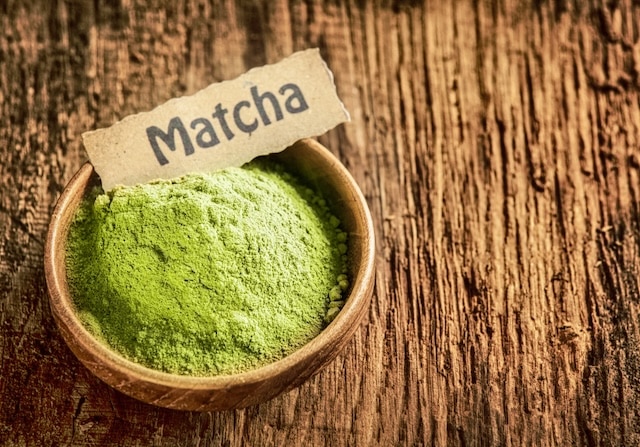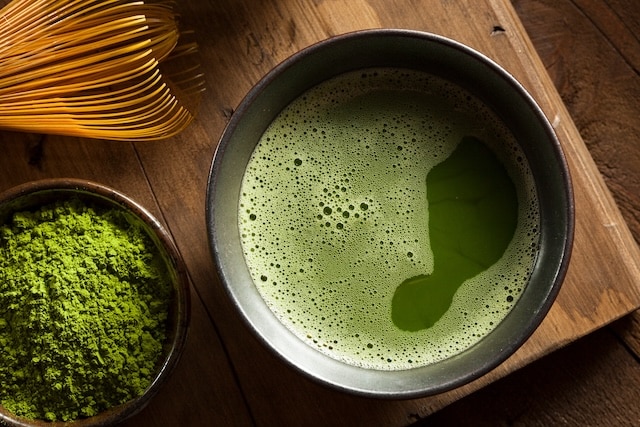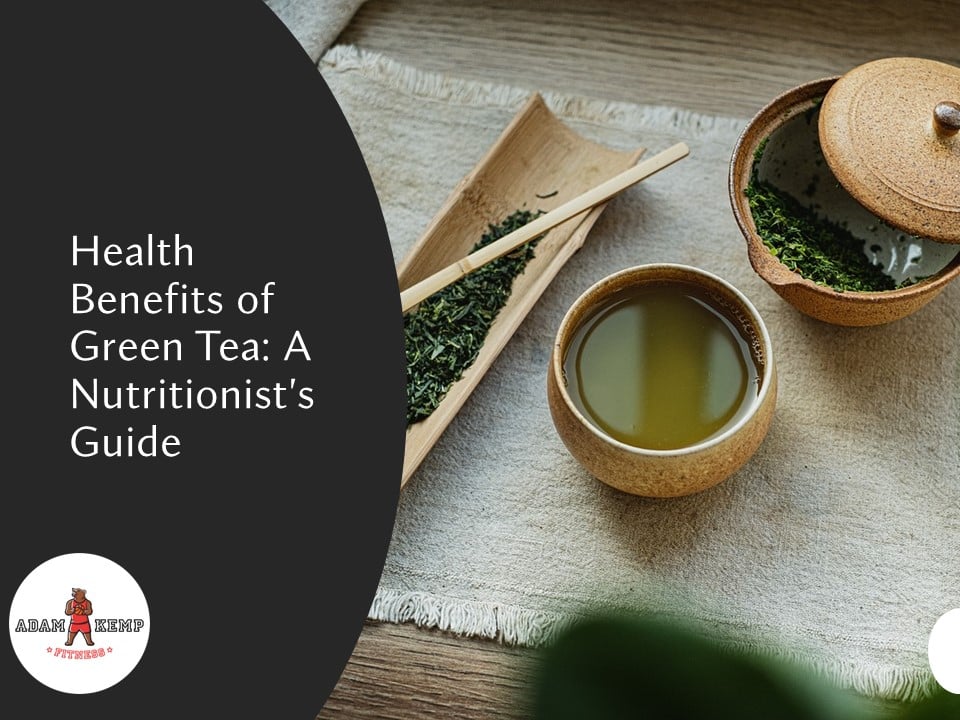Green Tea Health Benefits: Why is Green Tea Good for You?
Green tea is more than just a drink. It’s a tradition enjoyed by people all over the world, known not just for its soothing qualities but also for its multitude of health benefits backed by both time-honored traditions and rigorous modern science.
But green tea’s magic doesn’t stop at its powerful antioxidants, including the highly praised catechins.
Thanks to its various bioactive compounds, there are a variety of health benefits of green tea.
The combination of caffeine and L-theanine in green tea gives us a gentle boost of alertness without the jitters, and even brewing and enjoying a cup of green tea can be a calming habit in our busy lives – a little oasis of peace that helps us manage daily stress.
In other words, green tea is more than just a drink. It’s a way to nurture our health and well-being, nourishing our body and mind with every cup.
Whether you’re a long-time fan or just beginning to discover the health benefits of green tea, exploring the world of green tea, read below to learn more about the rich tradition, unique flavors, and health benefits every cup offers!
What is Green Tea?
Green tea is a type of tea made from the leaves of the Camellia sinensis plant, the same plant used to produce black and oolong tea.
However, unlike black tea, which undergoes oxidation, green tea is minimally processed to retain its natural color, delicate flavor, and high antioxidant content.
The production of green tea involves quickly steaming or pan-firing the leaves to prevent oxidation before they are dried.
This process helps preserve its rich concentration of polyphenols, particularly epigallocatechin-3-gallate (EGCG), a powerful antioxidant known for its potential health benefits (Sharpe et al., 2016).
Green tea has been consumed for centuries in many cultures, particularly in China and Japan, where it is valued for its refreshing taste and wellness-promoting properties.
Regular consumption is associated with improved metabolism, cardiovascular support, and anti-inflammatory effects (Chow & Hakim, 2011).
Green Tea vs. Matcha – What is the Difference?

Green tea and matcha both come from the Camellia sinensis plant, but they differ significantly in how they are grown, processed, and consumed.
These differences affect their nutritional content, flavor, and health benefits.
Both green tea and matcha offer powerful health benefits, including improved metabolism, enhanced brain function, and cardiovascular support.
However, matcha provides a more concentrated dose of antioxidants and nutrients, making it the superior choice for those seeking maximum health benefits.
Processing & Preparation
- Green Tea: The leaves are steamed or pan-fired, then dried and either left whole or broken into smaller pieces. When brewed, only the extracted compounds are consumed, while the leaves are discarded.
- Matcha: The tea plants are shade-grown for several weeks before harvest, increasing their chlorophyll and amino acid content. The leaves are then stone-ground into a fine powder, meaning the entire leaf is consumed when mixed with water.
Nutritional Differences
- Green Tea: Contains antioxidants, particularly catechins like epigallocatechin-3-gallate (EGCG), but in lower concentrations compared to matcha since only the infused water is consumed.
- Matcha: Has significantly higher levels of EGCG and L-theanine, as well as a greater concentration of vitamins and minerals, since the whole leaf is ingested.
Caffeine Content
- Green Tea: Contains around 25-50 mg of caffeine per cup, providing a gentle energy boost.
- Matcha: Contains approximately 60-70 mg of caffeine per serving, offering a more sustained energy boost without jitters, thanks to its high L-theanine content, which promotes calm focus.
Flavor Profile
- Green Tea: Light, grassy, and slightly bitter, depending on the variety and brewing method.
- Matcha: Rich, creamy, and umami-forward with a natural sweetness due to its unique growing process.
Top 10 Health Benefits of Green Tea

There are numerous ways that green tea can support optimal health, but here are the top 10 reasons green tea is good for you:
1.) Natural Skincare Properties
One of the primary health benefits of green tea is its impact on your skin health.
Drinking green tea and using green tea products on your skin is an excellent way to get healthier skin because green tea is rich in antioxidants and anti-inflammatory compounds.
Its high polyphenol content helps neutralize harmful free radicals, which can cause significant damage to the skin and accelerate the aging process (Chacko et al., 2010).
Anti-Aging Properties
Its effectiveness in combating early signs of aging, such as wrinkles and fine lines, is attributed to its antioxidant properties that counteract oxidative stress, one of the primary contributors to skin aging (Hsu, 2005).
Treatment for Dark Circles and Puffy Eyes
Green tea also addresses issues like dark circles and puffy eyes.
Its caffeine content shrinks blood vessels under the skin around the eyes, reducing puffiness and dark circles.
Repurposing a used tea bag into a compress is a simple way to harness these benefits (Herman & Herman, 2013).
Protection from Sun Damage
Interestingly, green tea also acts as a natural sunscreen.
Its polyphenols can absorb ultraviolet light and help neutralize the harmful free radicals that are produced by exposure to the sun’s rays.
This protective effect can reduce inflammation and prevent DNA damage that could lead to skin cancer (Chen et al., 2011).
Effective Acne Treatment and Prevention
One of the key benefits of green tea is its ability to fight acne naturally, as its powerful antioxidants reduce sebum production, calm inflammation, and inhibit acne-causing bacteria for clearer, healthier skin.
Green tea is a potent ally for acne-prone skin due to its anti-inflammatory and antimicrobial properties.
The catechins in green tea, especially EGCG, exhibit strong antibacterial effects that can inhibit the growth of acne-causing bacteria, Propionibacterium acnes (Yoon et al., 2013).
In addition, these catechins can also reduce inflammation and sebum production, two critical factors in the development of acne (Lu & Hsu, 2016).
A creative and effective way to use green tea for acne treatment is to freeze freshly brewed green tea into ice cubes and apply them to the skin.
This treatment provides a cooling effect, reducing inflammation and the size of acne lesions (Saric et al., 2017).
2.) Promotes Weight Loss

Green tea is one of the best types of tea for weight loss due to its rich content of catechins.
These catechins slow down the activity of digestive enzymes, moderating the absorption of calories and leading to potential weight loss (Bhardwaj & Khanna, 2013).
To enhance the weight-loss effect, consider drinking green tea before high-carbohydrate meals.
It can decrease the spike in blood sugar levels that usually happens after meals, leading to less insulin production and less fat storage (Yang et al., 2014).
Green tea’s benefits extend beyond calorie control. It can stimulate metabolism, increase energy expenditure, and enhance fat oxidation, further aiding weight loss (Dulloo et al., 2000; Hursel & Westerterp-Plantenga, 2013).
I believe green tea for weight loss is especially effective if you drink it on an empty stomach, which is why it is one of the best teas to drink in the morning.
3.) Improves Workouts
Drinking green tea before workouts can give your training sessions an extra boost because the naturally occurring caffeine and catechins in green tea work together to make your exercise regimen more effective.
Caffeine is a well-known stimulant that can increase alertness and combat fatigue, allowing you to push harder and longer in your workouts (Doherty & Smith, 2005).
Additionally, it can increase the release of adrenaline, your body’s natural “fight or flight” hormone, which prepares your body for intense physical exertion (Magkos & Kavouras, 2005).
The catechins in green tea, particularly EGCG, enhance fat oxidation—an important factor for weight management.
Research shows that consuming green tea extract can significantly increase energy expenditure and fat oxidation, helping you burn more calories during your workout (Venables et al., 2008).
Moreover, combining caffeine and EGCG can improve muscular endurance, helping you perform better during resistance training exercises.
This especially benefits those aiming to increase muscle strength and power (Murase et al., 2006).
To harness these benefits, consider drinking green tea 30-45 minutes before your workout.
This timing allows your body to absorb the active ingredients and put them to work during your exercise session.
4.) Supports Gut Health
The health benefits of green tea extend well beyond weight management, cognitive enhancement, and immune defense.
Increasingly, studies illuminate the positive effects that green tea can have on the gut microbiome—the community of trillions of bacteria living in our digestive tract.
A well-balanced gut microbiome is vital for overall health, influencing everything from digestion to mood regulation.
Notably, the catechins in green tea have been shown to foster a healthy gut microbiota (Janssens et al., 2016). By inhibiting the growth of harmful bacteria and promoting the proliferation of beneficial ones, green tea can help maintain a healthy balance in your gut.
Moreover, green tea is rich in polyphenols, plant-based compounds that feed the friendly bacteria in the gut, fostering a healthier digestive environment (Boccellino & D’ Angelo, 2017).
By creating a more hospitable environment for beneficial gut bacteria, green tea may aid in efficient digestion, improved nutrient absorption, and overall gut health.
Regular consumption of green tea might also alleviate symptoms of gastrointestinal disorders.
For instance, studies have suggested that green tea can help manage symptoms of inflammatory bowel disease, a group of disorders characterized by chronic digestive tract inflammation (Perez-Burillo et al., 2021).
As research continues to uncover the complex relationship between the gut microbiome and our overall health, the role of green tea in promoting a healthy gut emerges as an area of great interest.
So, the next time you enjoy a cup of this versatile beverage, remember you’re not only treating yourself to a comforting drink but also improving your gut health.
5.) Improves Brain Health
Green tea’s caffeine content stimulates the brain without causing the jitteriness often associated with coffee consumption.
Unlike the caffeine spike and subsequent crash from coffee, the caffeine in green tea is released more slowly, providing a sustained level of alertness (Haskell et al., 2008).
Green tea is also rich in L-theanine, an amino acid that crosses the blood-brain barrier and increases the production of calming neurotransmitters, creating a state of relaxed alertness.
Research shows that combining L-theanine and caffeine in green tea can enhance cognitive performance and mood, making it an excellent alternative to high-caffeine drinks for mental stimulation (Nobre et al., 2008).
6.) Natural Stress Management
Managing stress is crucial for maintaining overall health and wellbeing in our busy, fast-paced world. Here, green tea steps in as more than just a calming beverage but a potential aid in stress management.
One of the key constituents of green tea that makes it a potential stress reliever is an amino acid known as L-theanine.
This unique amino acid is known to promote relaxation without causing drowsiness, essentially inducing a state of calm alertness.
The result is a better ability to cope with the mental stresses of daily life without sacrificing productivity or focus.
Moreover, L-theanine in green tea has been found to stimulate the production of brain waves, known as alpha waves.
These brain waves are associated with a state of relaxed wakefulness, enhancing our ability to stay calm and focused even under stressful conditions (Kimura et al., 2007).
It’s also worth noting that the practice of brewing and drinking a warm cup of green tea can serve as a form of mindfulness practice itself.
The process of preparing the tea, the aroma of the brew, and the taste as you sip all contribute to a calming action that can help naturally alleviate stress.
In a study exploring the relationship between green tea consumption and stress, researchers found that participants who drank five or more cups of green tea daily had a lower stress level than those who consumed less than one cup per day.
These findings suggest that regular consumption of green tea might be associated with reduced stress levels.
Therefore, incorporating green tea into your daily routine could provide both physical and psychological benefits in managing stress, promoting a sense of calm and wellbeing.
7.) Boosts Immune System
Fortifying your body’s natural defenses with regular green tea consumption can be a powerful strategy in warding off illnesses, as a growing body of research suggests a link between regular green tea intake and a strengthened immune response (Steinmann et al., 2013).
A potent component in green tea contributing to this immunity boost is catechins.
The catechins in green tea help prevent harmful viruses and bacteria from attaching themselves to cell walls, inhibiting their ability to infect cells (Nakayama et al., 1993).
Furthermore, the catechins in green tea promote a type of detoxification that removes toxins and microbes from the body, showcasing the drink’s antimicrobial properties and making it one of the best natural detox drinks.
From protecting against the common cold and flu to mitigating the risk of microbial and fungal diseases such as diarrhea, tooth decay, and dysentery, green tea is a beverage that potentially safeguards your health in many ways (Taylor et al., 2005).
With every comforting sip of green tea, you’re enjoying a timeless drink and bolstering your body’s resilience against infections and illnesses.
8.) Can Help Prevent Breast Cancer
One of the most significant benefits of green tea for women is that green tea may help reduce the risk of breast cancer due to its epigallocatechin-3-gallate content.
For example, a study in the Japanese Journal of Cancer Research found that women who drank more green tea before diagnosis had better early-stage breast cancer outcomes.
Additionally, the International Journal of Cancer reported that higher green tea intake significantly lowered breast cancer risk, even after adjusting for lifestyle factors.
Green tea’s protective effects come from its ability to:
- Neutralize free radicals and preventing DNA damage that can lead to cancer.
- Inhibit cancer cell growth and slowing down tumor progression.
- Supporting hormonal balance and reducing the likelihood of hormone-related breast cancers.
9.) Supports Testosterone and Promotes Sexual Health for Men
One of the key benefits of green tea for men is its ability to support healthy testosterone levels and prevent common sexual health problems.
Testosterone plays a vital role in men’s health, influencing muscle growth, energy levels, and sexual function.
Maintaining optimal testosterone levels is essential for overall well-being, and green tea may offer natural support in this area.
One key way green tea benefits testosterone production is by reducing cortisol, a stress hormone that can negatively impact hormonal balance.
Chronic stress is known to suppress testosterone levels, but green tea’s L-theanine content promotes relaxation while its antioxidants combat oxidative stress, helping to protect hormone function.
Additionally, green tea catechins may improve circulation by enhancing blood flow, which is critical for erectile function and reducing the risk of developing common sexual health problems.
Studies suggest that regular green tea consumption can help support vascular health and may reduce the risk of erectile dysfunction by promoting healthy blood vessel function (Neves et al., 2008).
By incorporating green tea into your daily routine, you’re not only benefiting from its metabolism-boosting and heart-supporting properties but also giving your hormonal health a natural advantage.
10.) Supports Heart Health and Circulation
One of the most researched and promising benefits of green tea is its ability to support cardiovascular health.
Green tea catechins, especially EGCG, have been shown to improve blood lipid profiles by lowering LDL cholesterol and triglyceride levels while raising HDL cholesterol (Kuriyama et al., 2006).
Additionally, regular green tea consumption may improve blood vessel function by enhancing endothelial health, which supports better circulation and reduced blood pressure (Hodgson et al., 2013).
These combined effects can reduce the risk of developing atherosclerosis, heart attack, and stroke, making green tea a simple yet powerful addition to a heart-healthy lifestyle.
Brewed Green Tea vs. Green Tea Supplements
Green tea’s well-established health benefits have led many to consider not just the traditional brewed beverage but also green tea extract supplements.
These extracts are marketed as a concentrated way to obtain green tea’s beneficial compounds, but are they as effective as brewed tea? Let’s dive into the comparison.
Green tea, when brewed from loose leaves or tea bags, is a natural source of beneficial compounds like polyphenols, including the much-lauded catechin, Epigallocatechin-3 gallate (EGCG), as well as L-theanine and modest amounts of caffeine.
These compounds work synergistically to provide the array of health benefits associated with green tea, such as supporting weight management, boosting immune function, improving cognitive health, and promoting a healthier gut.
Green tea extract supplements, on the other hand, are a concentrated source of green tea’s beneficial compounds.
They often contain a higher concentration of EGCG than typically found in a single cup of green tea, making them seem attractive for maximizing health benefits (Zaveri, 2006).
However, the question remains whether these concentrated extracts deliver the same health benefits as brewed tea.
Some studies suggest that the body may absorb catechins more effectively from drinking tea than from taking supplements due to other compounds in the tea that aid absorption (Chow et al., 2003).
Also, the higher concentrations of EGCG in supplements can sometimes lead to side effects like nausea or upset stomach, especially when taken on an empty stomach (Lambert et al., 2007).
Additionally, consuming green tea in its traditional brewed form provides an experience—taking time to prepare and enjoy a cup of tea can serve as a form of stress relief and mindfulness, which may offer further mental health benefits beyond the compounds in the tea itself.
Ultimately, both methods of consuming green tea have potential benefits.
Whether to drink or take it as a supplement depends on individual preferences, tolerances, and lifestyle factors. It is always recommended to consult with a healthcare provider before starting any new supplement regimen.
Recommended Daily Intake of Green Tea for Optimal Health Benefits
It’s important to remember that the benefits of green tea are most pronounced when consumed in the right quantities.
While the ideal dosage can vary depending on factors such as age, health status, and individual tolerance, some guidelines can be helpful.
Research suggests that consuming about 3-5 cups of green tea daily is considered safe and beneficial for most healthy adults (Yang et al., 2009).
This quantity is believed to provide between 250 to 500 milligrams of catechins, which is the dose most often associated with green tea’s health benefits.
For specific benefits like weight loss, some studies indicate that taking green tea extracts or consuming green tea as a drink can aid weight loss and weight maintenance.
However, consistent intake over a sustained period, alongside a balanced diet and regular exercise, is key.
As for cognitive health, even a single cup could make a difference, as L-theanine and caffeine, both found in green tea, have been shown to have immediate effects on brain function.
Remember, while green tea is a beneficial health drink, drinking it in moderation is essential to avoid potential side effects associated with excessive consumption, such as insomnia due to its caffeine content or the potential for decreased iron absorption due to its tannin content.
Always listen to your body and adjust your intake accordingly. If you have specific health concerns or are taking medication, consult your healthcare provider for personalized advice.
Potential Side Effects of Green Tea Consumption
While green tea is lauded for its health benefits, it’s important to note that, like any substance, it may have potential drawbacks or cause adverse reactions in some individuals.
Green tea is rich in caffeine, and although its caffeine content is less than that of coffee, excessive intake can lead to symptoms such as insomnia, jitteriness, upset stomach, or a rapid heartbeat (Bohn, 2013).
It’s advisable to monitor your caffeine intake and limit consumption if you’re sensitive to its effects.
Moreover, green tea contains tannins, which can interfere with the absorption of iron and other minerals from your diet (Zijp et al., 2000).
To mitigate this effect, avoid drinking green tea with meals, particularly if you have an iron deficiency.
In some cases, green tea extracts—often used in weight loss supplements—have been linked to liver damage. However, this is rare, typically associated with high doses, and is less likely to occur with brewed tea (Navarro et al., 2017).
Lastly, while green tea is a natural product, it can interact with certain medications. For instance, it can enhance the effects of stimulant drugs or interfere with the absorption of certain medications, such as beta-blockers and anticoagulants.
If you’re on any medication, it’s important to consult your healthcare provider before increasing your green tea consumption.
Remember, while green tea can be a beneficial addition to a healthy lifestyle, moderation is key.
As with any dietary changes or supplements, it’s always advisable to consult with a healthcare provider before making significant changes to your routine.
Final Thoughts: Is Green Tea Healthy?

Green tea is widely regarded as one of the healthiest beverages, thanks to its high antioxidant content, metabolism-boosting properties, and potential cardiovascular benefits.
Rich in catechins, particularly epigallocatechin-3-gallate (EGCG), green tea supports cellular health, reduces inflammation, and may even aid in weight management.
Its moderate caffeine content provides a gentle energy boost without the jitters associated with coffee, while the presence of L-theanine promotes relaxation and mental clarity.
Regular consumption has been linked to improved heart health, brain function, and longevity.
For those looking to maximize the benefits, matcha green tea offers an even more concentrated dose of antioxidants and nutrients.
However, even traditional green tea remains an excellent choice for anyone seeking a natural, health-supportive beverage.
Whether enjoyed hot or cold, green tea is a simple, effective way to support overall well-being and enhance daily hydration.
Read Next: Coffee vs Green Tea: Is Green Tea or Coffee Better for You?
This website does not provide medical advice. This website site does contain affiliate links, and purchases may earn a commission.
Read my Medical Disclaimer, Review Disclaimer, and Publishing Policies for more details. Use of this site indicates acceptance of these terms.



